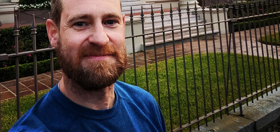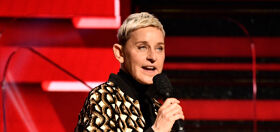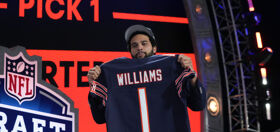
If people can clock your sexuality from the lilt of your voice and the enunciation of your words, you may have what comedian Guy Branum calls “a truly, magnificently gay voice.”
The Washington Post broke down the stereotypical “gay voice” in 2015, when the documentary Do I Sound Gay? came out: “A man speaks at a higher pitch, and in a more melodious fashion. The man might pronounce his p’s, t’s and k’s very crisply, or have what’s sometimes (incorrectly) described as a ‘lisp.’”
As the Post noted, researchers have gleaned that gay voice “has more to do with the voices that a person identified with as they grew up, rather than sexuality” and that gay men and straight men alike develop more feminine voices “because they are influenced by women when they are young.” But other influences include one’s peers and one’s self identity.
Related: Let’s hear it for this “gay voice” appreciation post
How about we take this to the next level?
Our newsletter is like a refreshing cocktail (or mocktail) of LGBTQ+ entertainment and pop culture, served up with a side of eye-candy.
University of Minnesota researcher Benjamin Munson found in a study that gay men’s pronunciation differed than that of straight men, and Munson speculated that gay men in the study wanted to convey a stylish and cutting-edge identity. “As speakers of a language, we have lots of freedom in how we pronounce sounds,” he told the Post. “People exploit that variation to create different social meanings.”
The aforementioned Branum wrote an opinion piece about his gay voice for The New York Times in 2018. As he explained, when he realized in his youth that his voice made him different, he was “quiet, very quiet, for a long time.”
As an adult, however, Branum understood that forming a community means speaking up and being visible. He wrote:
Heterosexual society wants to keep us weak, apart and uneducated, so it strips us of the tools we need to find one another and learn from one another. I was trained to be quiet, and to hope other people like me would stay quiet to keep us safe. But many gay voices ignored that teaching and became grand and loud. That’s why I love my voice and the voices of other gay men. From Edwardian novels to pop music, from Broadway to comic books, they’ve erupted with beauty, culture, cooperation, music, opinions about Alfre Woodard and sex. Gay art isn’t just works from an underrepresented community; it’s voices that were trained to hide and be silent but were resolute enough to make noise despite the danger. They didn’t know me, but they did it for me.
Related: Ross Mathews has perfect response to critic of his “fake” “gay voice”
Twitter users, meanwhile, have found the humor — and the power and the glory — in the gay voice. Behold their observations:
Gay voice? Oh, you mean the gaccent?
— Himbo Elegy (@TrashmouthRex) December 30, 2022
When I’m in public and I hear a gay voice shout BIIIITCH pic.twitter.com/lY2jbOjKwn
— frankie says relax (@frankbluecheck) February 17, 2023
The code switch from ? to deep gay voice I make on work calls is giving vers bttm trade voice
— Alex Chavez ?? (@PacoDONTdie) February 24, 2023
using my ?gay voice? so the gay guy checking me into the hotel knows
— guy (@The53Dude) August 17, 2021
FACT: every velociraptor in the Jurassic Park CU is gay
?? Travel/hunt in packs at night
?? Pathologically smarter than the other dinosaurs
?? Ruthless
?? Gay Voice screeches
?? Stunt queens
?? Are first seen on screen causing drama in a kitchen pic.twitter.com/YlMpxqjEtg— Russell (@RussellFalcon) April 19, 2018
in my gay voice i yelled “omg luv thaat” while one of our new teammates was introducing herself, talking about the sound of music. didnt know i was unmuted. the whole legal dept there lmaoo ??
— Patrick GmbH (@PatrickGutier) February 22, 2023
New Patch Notes: Added “MOVE IM GAY” voice line for soldier 76 whenever he sprints
— ? ? Cake ?? (@drowsycakes) January 7, 2019
Shout out to the cashier at Fred Meyer in Issaquah when we checked out who said “I was worried y’all a bunch of dude bros but then I saw your clothes and heard your gay voice. Y’all furries? Dope, love this shit, I hope your Canada ID isn’t fake. Keep being animals l-o-l”
— ?NOMAD COMPLEX ? VF / FE / FWA (@NomadComplex) April 3, 2022
23AndMe told me I have more Neanderthal DNA than 87% of the world’s population. Scientists also studied Neanderthal necks and found out they likely had loud high pitched voices. So you may THINK I have gay voice but it’s actually NEANDERTHAL VOICE!
— Greg Brown (@Whalewatchmeplz) October 24, 2018
I used to be really ashamed of my gay voice and being a fem twink but now I'm like pic.twitter.com/UWmMTIFq9Z
— Southern Homo (@SouthernHomo) July 1, 2018
Yesterday my French tutor said that when I speak in English I have an accent she hasn’t heard before and when I asked her if maybe it was Californian she thought for a second and then shook her head and said “no, it’s gay.”
— Grant Ginder (@GrantGinder) May 27, 2022
I really put my SAT students at ease by having a super gay voice. They’re like “ohh well if this choir teacher from Provincetown can do this, then I can too”
— Paul McCallion (@OrangePaulp) May 3, 2020
as someone with a gay voice, every character I audition for is legally required to say the line “Sweetie!! DUMP him!” at least once per page
— Paul McCallion (@OrangePaulp) May 18, 2020


















Terry
It’s all very “extra” and we like it that way 🙂 I think some of us are born with the ‘gay voice’, but most of us put it on – to fit in. If you don’t have sibilant Ss in West Hollywood and are anything but a screaming queen you just won’t fit in.
bachy
It’s “ghetto voice.” Plays well in the gay ghetto, but no so much elsewhere…